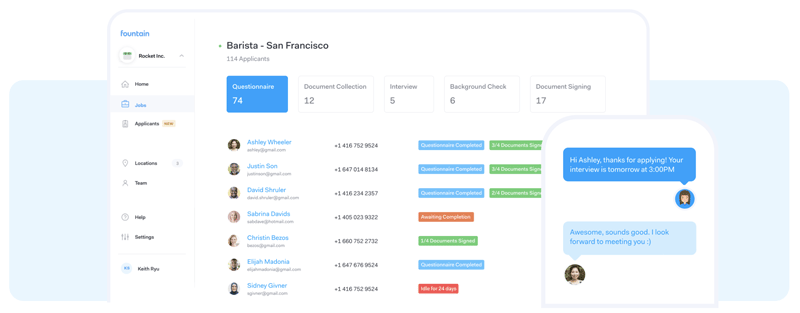The world of food delivery gets a lot of attention for being a flexible way for people to find work without much effort. It might seem to most people that a potential driver just signs up and starts driving, but there is still a lot of recruitment happening for the delivery networks.
Fountain, a recruiting platform for gig and hourly workers, has been working in this little-known corner of the space since it was founded in 2015. Now, with a fresh $23-million capital injection, the Bay Area-based company is poised to expand its offerings further into both traditional hourly employment and gig economy workers.
CEO Keith Ryu told Food On Demand that part of the new funding would help the company expand to meet all the folks who saw the offering and wanted it for their retail companies, but also expand the leadership team. He said the founding thesis was all about making it easier to reach the fairly unique demographics supporting these sorts of jobs.
“We saw a big shift in how people were finding work,” said Ryu. “Our thesis at the time: recruiting for this demographic was a fundamentally different program than recruiting for white-collar roles that required a different solution.”
And it’s a massive category. In the U.S., this hourly workforce group accounts for 60 percent of the workforce or 80 million people. And it includes just about everyone south of a hefty trust fund and north of a beet farmer at some point in their life.
“Although it’s massive, it’s a demographic that largely doesn’t live online. Ninety percent of the candidates come in without a LinkedIn or a resume, which makes it inefficient for everyone; the hirers have to call everyone. And if the workforce did a great job, that work history doesn’t follow them,” said Ryu. “The second piece, even after the company vets someone and invites them on for an interview, there’s a 40 percent no-show rate.”
Ryu says that shows that these folks tend to “spray and pray” when it comes to applying to jobs, so the most important metric—potentially more important than pay and perks—is speed of contact and hiring.
“That means people have to move quickly, anyone who can get them in first can win,” he added. “We took a lot of inspiration from marketing innovation software, much more about workflow and innovation. So we help companies find candidates help with assessments whether its videos or tests, background checks, collecting documents like their driver’s license, contract documents and onboarding 1099.”
Currently, Fountain follows that process for about 1 million applicants a month, mostly for gig employers. The tools, according to Ryu, will work for just about any high-turnover business.
It’s a pretty interesting blending of gig and traditional retail employment, and one that shows how the gig world continues to reshape the workforce and how to find labor.


